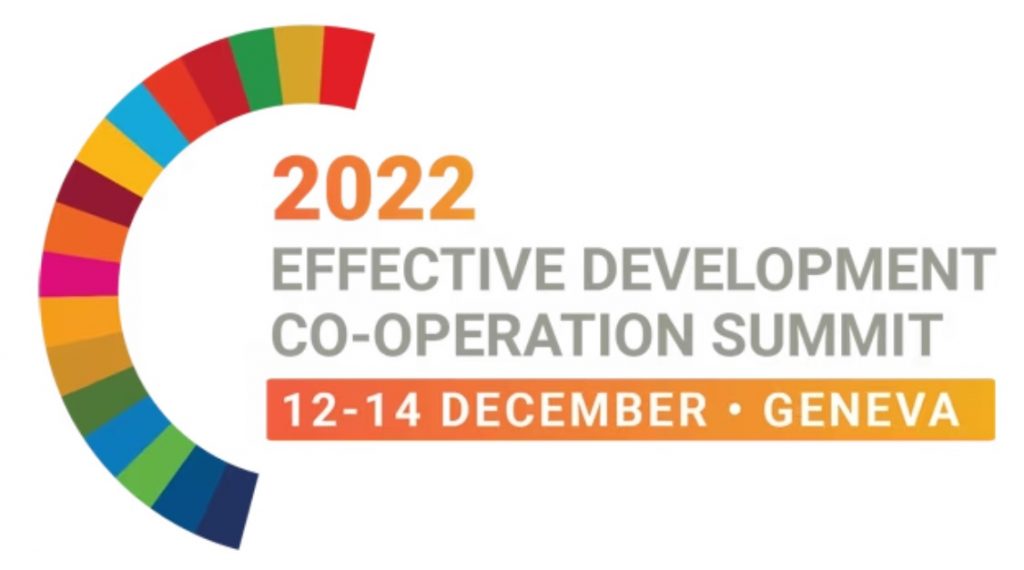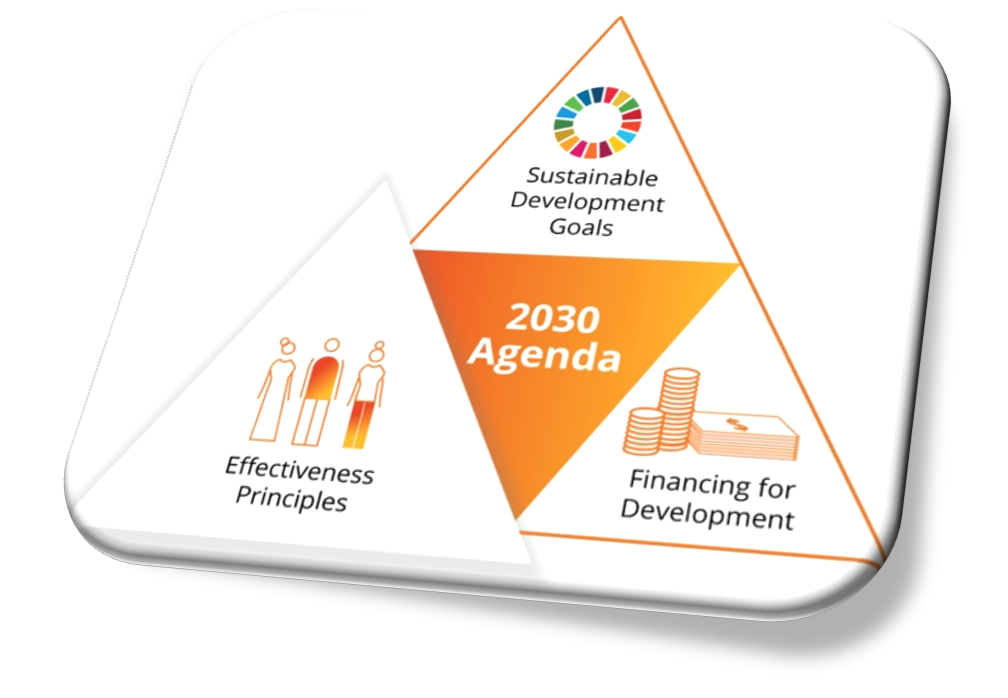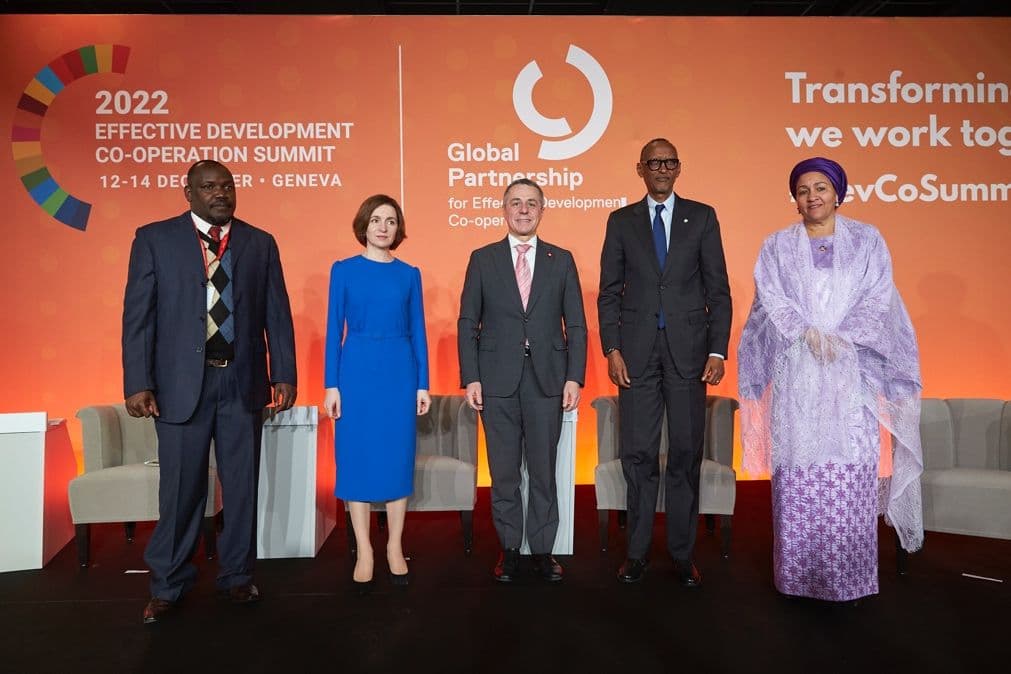Author: Sun Weiqing
In December 2022, the Summit on Effective Development Cooperation and the third high-level meeting of the Global Partnership for Effective Development Cooperation adopted the "Geneva Summit Declaration", emphasizing the four principles of effective development cooperation: country-led, results-oriented, transparency and accountability, and actively Promote progress in the implementation of the Sustainable Development Goals.
Total words2722About6In December 2022, the Summit on Effective Development Cooperation and the third High-Level Meeting (HLM) of the Global Partnership for Effective Development Cooperation (GPEDC) will be held in Vienna. The meeting emphasized the four principles of effective development cooperation: country-led, results-oriented, transparency and accountability, summarized the implementation progress of the global partnership for effective development cooperation, urged the principles of effective development cooperation to run through future decision-making through the "Geneva Summit Declaration", and actively promoted sustainable development. Progress has been made in the implementation of the Sustainable Development Goals (SDGs).
What is the Development Effectiveness Agenda?
In the 1970s and 1980s, concerns arose that ODA had failed to deliver expected development outcomes in developing countries such as those in sub-Saharan Africa. Since the 1990s, Western donor countries have begun to discuss the issue of aid effectiveness, and established, reviewed, and updated the principles of development effectiveness through a series of international conferences in order to maximize the impact of aid on development. The international community has come to realize that development assistance involves many stakeholders and that effective cooperation must be based on improved aid governance. Entering the 21st century, official development agencies are committed to making effective spending a central priority of official development assistance. Since 2011, countries have formed and improved a global consensus on development effectiveness through a series of international agreements.
From Aid Effectiveness to Development Effectiveness
In 2002, the International Conference on Financing for Development held in Monterrey, Mexico formed the Monterrey International Consensus and pointed out that developed countries and developing countries should establish a new type of partnership to fully implement the elimination of poverty, improving social conditions, raising living standards and protecting the environment. In 2003, the first High-Level Conference on Aid Effectiveness held in Rome further elaborated on this consensus. Donors are committed to simplifying and harmonizing development assistance, increasing collaboration, and increasing flexibility to increase the effectiveness of projects and programmes.
In 2005, the Paris Declaration on Aid Effectiveness first identified five principles for best practice in the effective management of ODA, namely national ownership, coordination, harmonization, results-based management and two-way accountability. Although the Paris Declaration's focus was limited to the process and quality of ODA allocation, it was a milestone in the global effort to achieve effective development partnerships. The signing of the Paris Declaration signaled the political support of governments for this agenda, while providing a framework for improving the quality of official development assistance and mutual accountability between donor and recipient countries.
The high-level forums on aid effectiveness, held in Accra in 2008 and then in Busan in 2011, broadened the inclusiveness of the aid effectiveness agenda, acknowledging the role of the private sector and emerging actors such as China in development cooperation. The effect is continuously strengthened. The Accra Agenda for Action identifies key areas for improvement and calls for a fundamental rebalancing of the donor-recipient relationship, including prioritizing the use of recipient country systems; improving aid predictability and transparency; development planning, with clear and significant progress towards unconditional aid; and by improving the division of labor within and across borders, reducing aid fragmentation. The Busan Declaration, adopted at the fourth and final high-level forum on aid effectiveness held in Busan in 2011, was supported by 161 countries and 56 international organizations, shifting the paradigm of international aid policy from "aid effectiveness" to "development effectiveness" and create the Global Partnership for Effective Development Cooperation (GPEDC) to replace the high-level forum on aid effectiveness.
What are GPEDCs?
The Global Partnership for Effective Development Cooperation, launched in 2012, is a multi-stakeholder platform to support the governance and implementation of the global development cooperation effectiveness agenda. The GPEDC is the primary mechanism for convening the Global Dialogue on Effectiveness, monitoring progress towards the implementation of the Effectiveness Agenda every two years through country-led surveys, gathering input and feedback on the Agenda from partner countries, and providing input to governments, civil society, bilateral and multilateral agencies , and the private sector provide a platform for exchanges and cooperation related to effective global development partnerships.
GPEDC is currently led by four co-chairs from Indonesia, Democratic Republic of the Congo, Sweden and Aid Reality Africa (NGO), working under the direction of a multi-stakeholder steering committee and supported by the OECD and the United Nations Development Program Support is provided by a joint support team composed of UNDP and others.
Global Partnerships for Effective Development
Since its establishment in 2012, GPEDC has held three high-level meetings in 2014, 2016 and 2022, and successively adopted the "Mexico Communique", "Nairobi Outcome Document" and "Geneva Summit Declaration".

(GPEDC/Graph)
What achievements has GPEDC achieved?
The first is to enhance the effectiveness of development cooperation.GPEDC is committed to promoting the effectiveness and influence of development cooperation, encouraging countries and stakeholders to follow the principles and practices of effective development cooperation such as ownership, coordination and results orientation, and promoting development cooperation to be consistent with host country strategies and priorities, supporting Partner countries take ownership of their own development processes and improve development outcomes.
The second is to strengthen monitoring and evaluation.GPEDC supports countries and stakeholders in monitoring and evaluating development cooperation to ensure efficient use of resources and advance the achievement of the Sustainable Development Goals. GPEDC monitoring is partner-country-led and aims to promote collective accountability for the effectiveness of development cooperation. Monitoring tracks the progress of governments, development partners and other actors in delivering on effective development cooperation commitments, leading to better development outcomes. Three rounds of global monitoring were conducted in 2014, 2016 and 2018. Ninety-nine countries and hundreds of development partners participated in the monitoring. The fourth round of monitoring is expected to be carried out from 2023 to 2026.
The third is to promote policy dialogue and knowledge sharing.GPEDC facilitates cooperation and exchange among countries and stakeholders by organizing high-level forums, policy dialogues, and knowledge-sharing events. These dialogues and events help to strengthen policy coordination and joint action to address global development challenges.
The fourth is to strengthen partnerships and focus on result orientation. GPEDC promotes partnerships between governments, civil society, the private sector and international organizations, and supports the participation of developing countries in decision-making processes to make development cooperation more inclusive and effective. Promoting a results-oriented approach to development cooperation that focuses on measurable results, which in turn drives accountability and better development outcomes.
The fifth is to promote South-South cooperation and tripartite cooperation.GPEDC supports South-South cooperation and triangular cooperation, encourages the exchange of knowledge, skills and resources among developing countries, and promotes mutual learning among countries to address common development challenges.
What is the future focus of GPEDC?
GPEDC has actively contributed to enhancing the effectiveness of development cooperation and advancing the global development agenda. The world today is facing many development challenges, and there is still much work to be done to achieve the Sustainable Development Goals. GPEDC's third high-level meeting "2022 Effective Development Cooperation Summit Declaration" proposed six priorities for future work: First, use a human rights-based approach in the principles of universality, indivisibility, equality and non-discrimination, participation and accountability Under the guidance of the United Nations, promote development cooperation and leave no one behind. Second, development cooperation should contribute to the realization of the climate commitments of the 2030 Agenda for Sustainable Development and the Paris Agreement. The third is to support and engage in multi-stakeholder dialogue at global, national and local levels to strengthen partnerships and build ownership of development priorities. The fourth is to strengthen the capacity of all actors and institutions at the national level so that they can achieve sustainable development through a coordinated approach of government integration and social integration. It is also a prerequisite for a sound, democratic development process. The fifth is to support capacity building of national statistical systems, including efforts to achieve digital transformation, improve data quality and disaggregation capabilities (e.g. by sex, age, race, climate impact, and sex), and facilitate information collection and processing for the benefit of development cooperation. statistical work and facilitate the sharing of information and data. The sixth is to better demonstrate the achievements of GPEDC at the national level and contribute to the realization of the 2030 Agenda and other agendas.

The development effectiveness agenda plays a critical role in addressing the changing global development landscape and emerging global challenges. The Geneva Summit and its declaration reaffirmed the importance of development effectiveness, highlighting a shared commitment to development cooperation, international partnerships and the Four Principles to "achieve results in nationally owned development and in addressing global challenges". This year is the mid-term assessment year of the United Nations 2030 Agenda for Sustainable Development. Further promoting development effectiveness will inject impetus into global development and make positive contributions to the realization of the Sustainable Development Goals.
References
https://effectivecooperation.org/system/files/2022-12/Final%20Outcome%20Document.pdfhttps://effectivecooperation.org/landing-page/about-partnershiphttps://effectivecooperation.org/landing-page/about-partnershiphttps://sdg.iisd.org/news/development-co-operation-partnership-commits-to-be-fit-for-2030-agenda/https://www.oecd.org/dac/42400399.pdf

All rights reserved, please indicate the source when citing.
